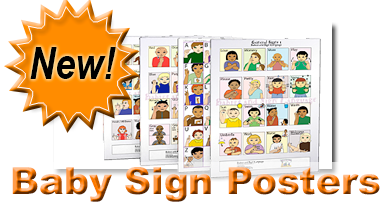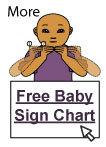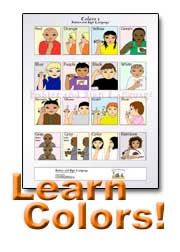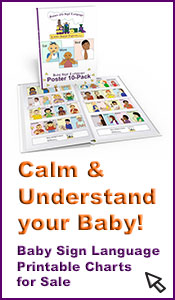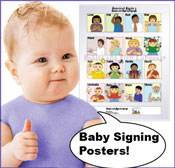Looking For a Step-by-Step Way to Learn Baby Sign Language?
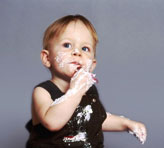
Get A Free Baby Sign Language 5-Day Course
- How to tell when Baby is ready
- First signs you should learn
- First signs you should teach
- Free mini-poster
- And more!
Just enter your email address below and click
Send My Baby Sign Course!
Fun Sign Language Related Activities
to Share With Your Baby
Get your Sign Language Poster Kit Today and Receive Two Gifts!
Teaching sign language to babies does not have to be simply making hand gestures. Incorporating sign language activities for baby can make the process of learning the language fun and exciting!
Babies naturally acquire signs based on two instincts: need and motivation. Dividing signs into these categories will give every parent a starting place for signing with their baby. An example of this is would be teaching your baby the signs for “hurt, bathroom, hungry, and thirsty” vs. teaching the signs for “toy, more, up, and play.” Teaching baby sign language is easy because both need-based and motivation-based signs can be taught through everyday life activities!
Here are a few categories of common signs that can enhance parent-infant communication.

Family: mom, dad, brother, sister, grandma, grandpa, boy, girl, baby
Food: hungry, thirsty, eat, drink, milk, cookie, pizza, apple, cheese, water, juice, all-gone!
Places: home, school, store, church, car, go, outside
Feelings: happy, sad, mad, sleep, tired, hungry, hurt, sorry, love, like, yes, no, finished
Requests: please, more, help, again, stop, who, what, when, where, why, which-one
Objects: toy, ball, pet, dog, cat, fish, game, chair, TV, balloonIncorporating simple signs like these into everyday activities is easy and will allow you to talk with your baby before your baby can talk. When your child is an infant, fun sign language related activities will often include the most basic events. For example, to teach the word “eat” you can sign while making the spoon “fly” into the baby’s mouth with food on it.
There are many strategies and tips for learning to make sign language an everyday habit
Choose one sign or group of signs to work on every day for a week
One of the techniques for teaching Baby Sign Language is to include signing as part of everyday activities. Sign language activities for baby increase the effectiveness of signing for instructional and educational purposes.
Use toys and objects as models for language
Another technique is to use baby toys to teach words and concepts. With a set of blocks a baby can learn both concrete objects and concepts. For example, when you stack blocks, you can say the word “block” each time you place one on top of the other. But you can also say “up” or “top” to indicate the block pile is rising. Sign language activities for babies should be fun and keep the attention of your infant.
Dolls make for a wonderful opportunity to teach a variety of hand gestures. You can hand an infant or toddler a doll and then help her or him dress it, feed it or comb its hair. Every action can be augmented with a sign for “doll”, “dress”, “eat”, “shoes”, “comb-hair”, etc. Every time you do an activity with Baby’s doll, be sure to use the same words and the same signs.
Being consistent is important when using sign language activities for babies.
Have your child use the language and tell you
There are many interactive games you can play to stimulate expressive language in your baby. Remember the motivational signs we mentioned earlier? Motivational signs are wonderful for increasing language. Think of physical activities that are common for you and your baby: swinging, bouncing a ball, lifting baby up, and playing with a favorite toy are great examples.
Use these activities to sign words like “more”, “up”, “again”, “where?” and “stop.” For example, when take your baby to the park (or outside) and blow bubbles - stop blowing, and sign the word “more” as you ask, “more bubbles?”. This is also a great opportunity to teach the signs for “big” and “pop”. (And "stop"!) Remember, key concepts are the best signs to begin teaching your baby. Before you know it, your baby will be signing and engaging in these fun activities with you!
The world is at your fingertips…use it!
Other fun sign language activities for baby include taking a walk or going to the park. At the park, there are many ways to have fun signing while actually touching or seeing the object. There are swings and slides and flowers and grass and so many other visuals/words that baby can learn in Baby Sign Language. At park, you can sit on the grass with the baby and sign ‘flower’ while putting a flower in his or her hand.
At the zoo you, Baby, and family members can practice signs for the names of the animals. With your imagination – sky’s the limit!

A picture is worth a thousand signs…
One of the best tools for teaching baby sign language is using books.
Sign language activities for baby that use books are educational and
benefit a child’s overall intellectual development. What’s cool is that
there are already so many books for infants! Books are wonderful as the
pictures and illustrated objects/people/animals in infant books are
always bright and colorful. Point to a picture and try to relate the
picture to something in the house. If there is a picture of a dog,
point to the household pet and sign dog. The opportunities are endless!
Make it a family affair!
As children grow older and are able to handle more complicated words and simple sentences, there is a world of sign language activities for baby. Sign language activities for babies can incorporate many events around the house. For example, parties make a great opportunity to teach sign language.
You can teach some of the signs before the party. You can teach signs for “cake”, “ice cream”, "candles" and so on.
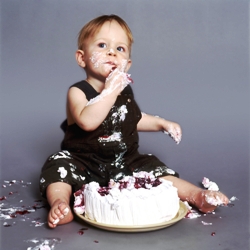
If you have included your family as suggested, once the party begins, relatives can sign to your infant (and have Baby engage them!) throughout the party as the occasion arises.
This has the added benefit of the infant seeing other people use sign language as a form of communication. Everybody understands Little Junior! What a marvelous family activity!
There are so many opportunities for teaching your baby sign language that it can feel delightfully overwhelming.
If you are not entirely positive on knowing where to start, just relax and take a deep breath…it’s okay!
The beautiful thing about baby sign language is that you can start just about anywhere.
Categorizing and grouping signs will help. Remember: language is all around you. When you learn to find and optimize language opportunities in everyday activities, teaching sign language will be an easy, memorable bonding experience for you and your baby.
